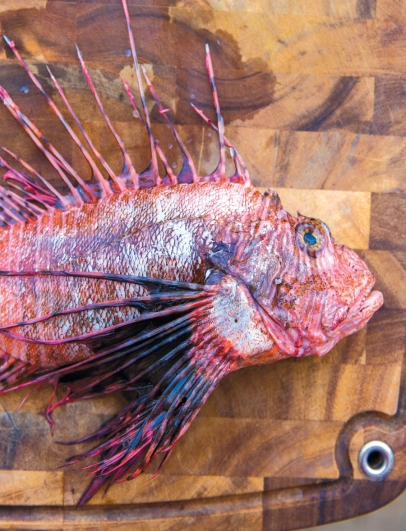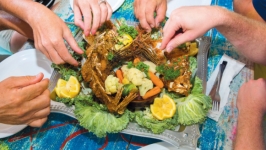Eat The Enemy
Leave No Lionfish Behind
The lionfish is a cool-looking animal with red and white zebra stripes and long pectoral fins. It’s beautiful to observe underwater while scuba diving the coral reefs of tropical waters. In their natural habitat they pose no threat to their marine ecosystem.
Sounds nice, right? Well, not so much.
Florida is not their natural habitat. This fish poses a serious danger to our marine ecosystem. They are destroying our area’s coral reefs and the fish population as well. They can and do eat everything in sight.
Back home in the South Pacific and Indian Ocean, the lionfish population is kept in balance by its natural predators like cornetfish and eels. But here, with no natural predators and a gluttonous appetite, the fish are able to reproduce every four days. A single fish can produce 2 million eggs a year. Despite many efforts to remove them from our waters, lionfish are elusive and are protected from local predators by their spiny exterior. They have 18 venomous spines that no fish wants to tangle with…not even sharks. If the lion is “king of the jungle,” then the lionfish is quickly becoming the “king of the reef.” Year after year their population continues to grow and grow.
In addition, this fish can’t be baited. Currently the only way the lionfish are being caught in volume is via scuba diving, spear fishing. To protect spear fishers from the vicious spines of the lionfish they have already speared, Sarasota resident Allie ElHage developed a container he calls the ZooKeeper. He began making ZooKeepers in Sarasota in March 2013.
How did lionfish get into our waters? The best guess is that in the mid-1980s aquarium enthusiasts who had lionfish as pets released some on the East Coast of Florida. The captive lionfish had turned into pests, killing all their other aquarium fish, so these pet owners set these fish free in the Atlantic without considering the consequences. Another theory is a rumor that Hurricane Andrew destroyed a coastal aquarium somewhere in the Caribbean, dumping many lionfish into the sea. Whether it was natural migration, a natural disaster, or human negligence, we now have a problem that must be addressed.
What do we do? We eat the enemy! Despite rumors that this fish is poisonous to humans, the fact is that it is not. After the spines’ venomous tips are removed, this fish is delish. It has a white, flaky texture and sweet flavor that surprises those who taste it. Because lionfish yields such a small filet, it is recommended that you eat this fish whole but make sure your local fishmonger cleans the fish and removes the venomous tips.
The anti-lionfish campaign includes many free-entry and sponsored tournaments plus continued research to make a better trap. We need to make locals aware of the devastation these animals are causing in the oceans around us. We need to encourage spear fishermen to leave no lionfish behind. Also we need to publicize the importance of eating these fish and how good they actually taste.
“We’ve got to eat them to beat them,” says Katie Sosa, owner of Sammy’s Seafood, a Florida wholesale distribution company. “We must educate all our end users such as chefs and restaurant owners on everything we source, sell, and filet. We have done it before.”
Some local efforts to help the cause include the sale of lionfish at Whole Foods and Big Water Fish Market. Big Water Fish Market serves whole lionfish dinners on Friday nights during the summer months, when available, in an effort to reduce the population of this malicious yet delicious fish.
THE LIONFISH DERBY
Lionfish derbies are an important way to harvest large numbers of this invasive species that have spread along the Eastern Atlantic Coast, through the Caribbean Sea and the Gulf of Mexico. Derbies help to remove lionfish, support research and public education, and provide an opportunity to taste this delicacy.
The Sarasota Lionfish Derby is hosted by Mote Marine Laboratory & Aquarium (a world-class marine science institution) in cooperation with Reef Environmental Education foundation and ZooKeeper, which is the Sarasota-based manufacturer of the leading lionfish containment unit used throughout invaded areas. The Sarasota Derby is July 8 weekend with weighin on July 10 at Mote Marine Laboratory. For more information, contact Allie ElHage at zookeeperlcu@gmail.com. To become a sponsor, or to make a donation to this event, please contact Kate Knepper at kknepper@mote.org.
Derbies are also held throughout Florida throughout the year. For more information about upcoming derbies, inquire at Lionfish@myfwc.com.
Also make sure you buy tickets to the Trash Fish Party presented by Edible Sarasota magazine for more awareness of sustainable local fish and a delightful evening of a chef’s dining experience of fish that you did not know you could eat. This event will be held on August 7. It’s a fish foodies’ party!





